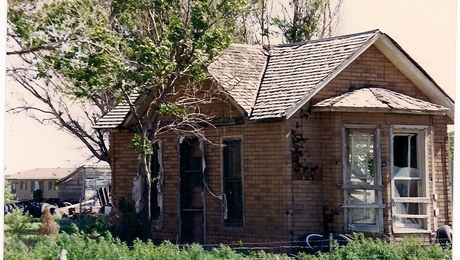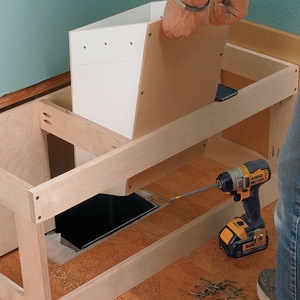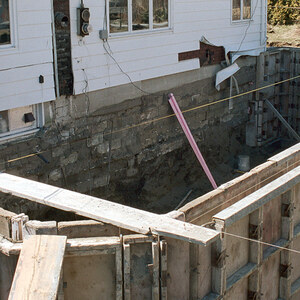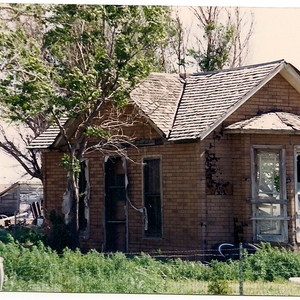While I understand the basics of wiring, this problem has me baffled and I was hoping some of you with more electical experience than I can help me out. I am in the process of remodeling my kitchen and have updated the wiring from knob and tube to something a little more modern. I ran all the circuits through a common metal conduit, feeding branch circuits out at strategically-placed junction boxes in the basement. Due to an ongoing squirrel infestation in our 150 year old house, I am using MC wiring from the junction boxes to the outlets, etc. Everything has been going well until I installed the dishwasher and garbage disposal. I elected to run them on the same circuit (legal in my town). They are hard wired and I wanted a GFIC for safety’s sake, so I bought and installed a GFIC breaker. This is my first experience with them. The problem is that the darned thing keeps tripping every time I try to flip it on. The appliances are not turned on at the time. At first I thought I had a bad breaker, so I replaced it and the second one does the same thing. A regular breaker works just fine. I have some thoughts as to why it may be happening, and would appreciate others’ input. Here are the possible problems: 1. I used a single ground wire in common for seven different circuits. I didn’t have room for seven separate ground wires in the conduit and figured one should cover all the circuits ok. 2. My main panel, installed by a licenced electrician, has no separate ground bus; both neutral and ground wires use the same bus. The neutrals are on one side of the panel, and the grounds on the other side, but there is a bonding bar connecting the two sides. 3. I have a GFCI outlet on the microwave circuit that shares the common ground wire. This circuit works just fine by the way.
I honestly can’t think of any other reason why this GFCI breaker won’t work. If I can’t get the problem resolved, I may have to install a GFCI outlet and plug the dishwasher and disposal into it. It’s alot more work for me that I’m hoping you all can help me avoid. I’d like to install another GFCI breaker for the kitchen outlets, but not if I keep having this kind of problem.
Thanks,
Conrad


















Replies
You've run a conduit with a common ground to a junction box where you splice off all these various circuits...unwire the feed to the dishwasher/garbage disposal, throw a couple of wirenuts on the hot and neutral and see if your ckt.brker will hold, if it does wire the hot on and see if it still holds, and then the neutral...this might help you isolate the problem. Any chance you might of confused a neutral from another ckt landing the wrong one on the ckt.brk.? The gfci neutral can't share another ckt. either. Can you run a seperate wire as a temp. ground to your j-box and retest the ckt.brk., just any lenth of wire along the surface and connect it to your dw/g.disp. wire?
1] There is nothing wrong with the single ground wire [properly sized: since this is a kitchen, I assume #12].
2) The tripping of the GFCI whereas an ordinary breaker doesn't trip indicates that there is some small leakage somewhere.
Are you sure that the neutral wire in the panel is connected to the breaker itself and not directly to the neutral busbar? [I.e. the neutral goes to a certain spot on the breaker and then the coiled white wire from the breaker goes to the bus bar. I did that once and it didn't work too well. But only once the siump pump turned on].
~Peter
As Bogart said, "Here's looking at Euclid."
Thanks everyone for your help. PM22 called it right and I feel like a total dolt. I had neglected to fasten the neutral wire to the GFCI breaker and instead had it fastened to the neutral bar. In hind sight it makes perfect sense why it wasn't working. Everything is working fine now and I'll go in the corner and eat some humble pie.
Conrad
If is is not what PM22 suggests then I think that this is your problems.
"I ran all the circuits through a common metal conduit, feeding branch circuits out at strategically-placed junction boxes in the basement."
You picked the neutral and hot off 2 different circuits.
Normally there is no difference until you do a GFCI.
But there is really no advantage to the GFCI in this case. Unless you like to work on them hot or don't trust your own wiring. The ground will give you all the protection that you need.
I think Bill's on the right track, (and he's never wrong:), it's either the wrong neutral or the neutral is touching the ground at some point. And Bill's also correct that a GFCI is not required for the disposal and dishwasher, and might even be subject to nuisance tripping even when properly wired.
Impossible to say from here exactly where the problem might be, but I have a client who has a repetitive problem with their dishwasher that results in tripping of the GFCI. The problem is in the DW's circuit board and was bad when brand new. Isolated the problem and the manufacturer sent out a service guy to replace the board. All was well for about a year and then it did it again. Another new board. About six months ago, that one went bad. Whirlpool, IIRC.
Wouldn't cost much to disconnect that and/or the garbage disposal and see what you've got then. Once you've got those disconnected from the circuit, check 'em with a meter for a fault.